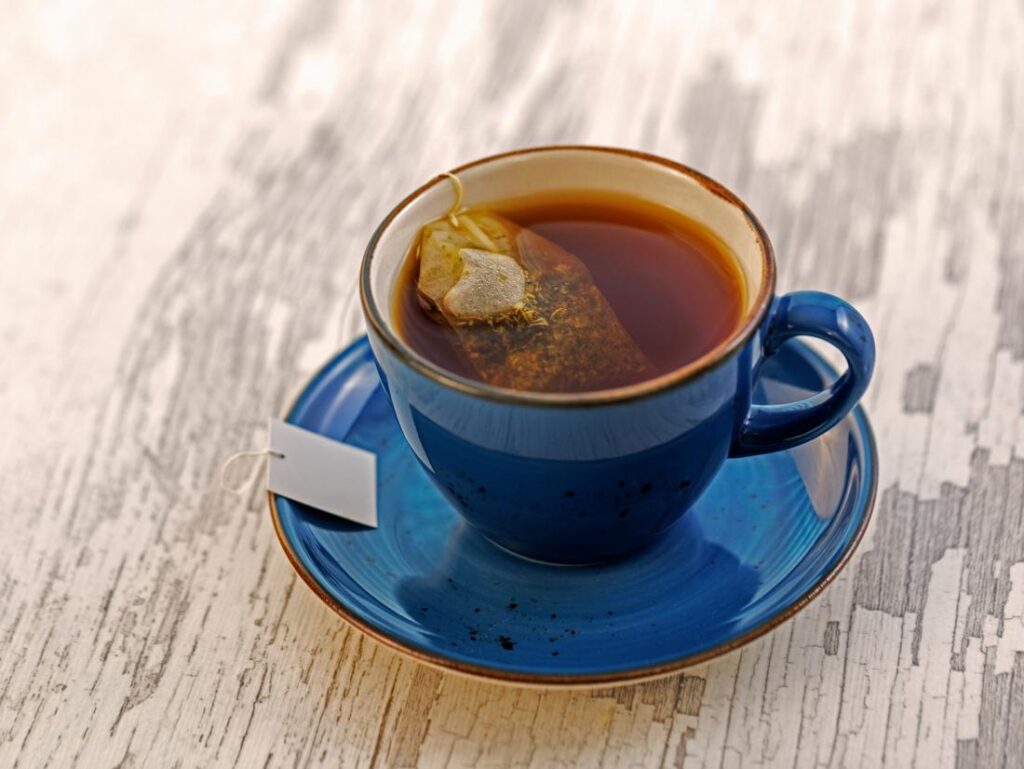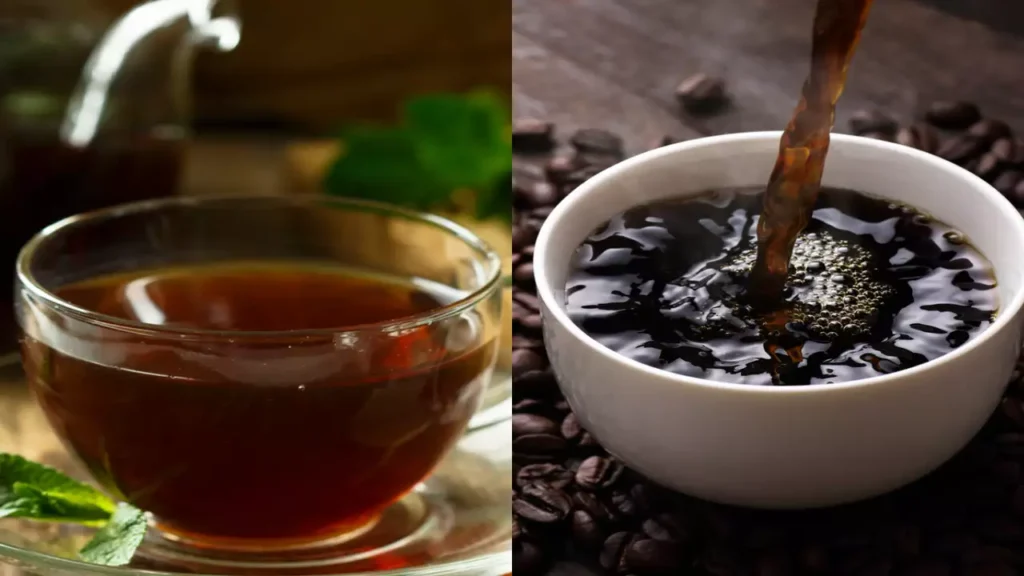Black Tea vs Coffee: The Ultimate Showdown
Hey there! Ever find yourself pondering over the perfect pick-me-up? Is it the bold, robust coffee or the smooth, comforting black tea? Well, you’re not alone in this brew-tiful dilemma! Today, we’re going to dive deep into the world of Black Tea vs Coffee, comparing these two beloved beverages head-to-head.
Imagine us sitting in your favorite café, discussing the pros and cons, the health benefits, and perhaps some surprising facts about each. By the end of this chat, you’ll be more equipped to make that crucial decision – Team Tea or Team Coffee? So, grab your mug, and let’s spill the beans (and leaves) on this tasty topic!

What is Black Tea & Coffee?
Black Tea: It’s more than just leaves in hot water! Black tea comes from the Camellia sinensis plant. After plucking, these leaves undergo a full oxidation process, turning them dark and intensifying their flavors. This process also influences caffeine content and antioxidants. From robust Assam to floral Darjeeling, each variety has its own character.
Coffee: Ah, the bean that rules the world! Coffee is made from roasted coffee beans, the seeds of berries from certain Coffea species. The roasting level greatly impacts its flavor, ranging from light and fruity to dark and bold. Coffee is loved for its high caffeine content and rich array of flavors and aromas.

- Preparation Variety: Black tea is usually steeped in hot water, with variations like adding milk, sugar, or lemon. Coffee brewing, on the other hand, is an art in itself – espresso, French press, drip, the list goes on!
- Cultural Impact: Both have a strong cultural footprint. Tea ceremonies in Asia, afternoon tea in the UK, and coffee culture in places like Italy and Ethiopia showcase their global influence.
- Health Benefits: Both offer health perks. Black tea is known for heart health and antioxidants, while coffee is celebrated for its brain-boosting properties and metabolism kick.
- Taste Profile: Black tea often has a bold, slightly astringent taste, while coffee’s profile ranges widely from bitter and strong to smooth and sweet, depending on the bean and brew method.
Which One Is Healthier?
Black Tea: A Healthy Choice
- Antioxidants Galore: Black tea is rich in polyphenols, antioxidants that can help reduce cell damage and support overall health. Think of it as your body’s little helper in fighting against daily environmental stresses.
- Heart Health Hero: Regularly sipping black tea could contribute to improved heart health. Studies suggest it may reduce the risk of heart diseases by helping to regulate cholesterol levels and blood pressure.
- Digestive Delight: Black tea contains tannins that have a soothing effect on the digestive tract. It’s like a gentle pat on the back for your stomach!
- Stress Buster: The amino acid L-theanine in black tea promotes relaxation and can help in reducing stress. It’s like a zen moment in every sip.
- Lower Risk of Diabetes: Some research indicates that black tea might help in reducing the risk of type 2 diabetes by improving insulin sensitivity.
- Weight Loss Companion: While it’s no miracle weight loss solution, black tea can aid in weight management. It boosts metabolism, helping the body burn fat more efficiently.
- Hydration: Unlike its coffee counterpart, black tea is less diuretic, meaning it’s better for keeping you hydrated.
- Caffeine Balance: With lower caffeine levels than coffee, black tea provides a gentle energy boost without the jitters. It’s the perfect middle ground for caffeine sensitivity.

The Downside of Black Tea
- Caffeine Concerns: Although lower in caffeine than coffee, black tea can still cause problems for those sensitive to caffeine, leading to jitteriness, insomnia, or a rapid heartbeat.
- Iron Absorption: Tannins in black tea can inhibit iron absorption from foods, posing a risk for individuals with iron deficiency or anemia.
- Staining Teeth: Regular consumption can lead to stained teeth, thanks to the high tannin content. It’s a cosmetic concern, but one to be aware of for your pearly whites.
- Bone Health: Excessive consumption might affect bone density over time, potentially leading to weaker bones, especially in those who don’t consume enough calcium.
- Heartburn and Digestive Issues: For some, the acidity and tannins in black tea can aggravate digestive issues like acid reflux or cause nausea, especially on an empty stomach.
- Overconsumption Risks: Drinking too much black tea might lead to headaches, nervousness, and sleep problems, highlighting the importance of moderation.

Coffee: A Healthy Brew
- Rich in Antioxidants: Coffee is loaded with antioxidants, even more than some fruits and vegetables. These compounds fight inflammation and protect against cell damage.
- Brain Booster: Regular coffee consumption is linked to a lower risk of Alzheimer’s and Parkinson’s diseases. It boosts brain function, enhancing memory, mood, and cognitive abilities.
- Metabolism and Weight Loss: Coffee can increase metabolic rate and fat burning, making it a helpful companion in weight management and fitness routines.
- Heart Health: Moderate coffee intake is associated with a reduced risk of heart disease. It’s like a little shield for your heart!
- Type 2 Diabetes Risk Reduction: Studies have shown that coffee drinkers have a lower risk of developing type 2 diabetes. It’s not a cure, but it’s a promising preventative ally.
- Liver Lover: Coffee may protect against liver conditions, including liver cancer and cirrhosis, especially for those who drink alcoholic beverages.
- Longevity Link: Some research suggests that coffee drinkers may have a lower risk of premature death, contributing to overall longevity.

The Downsides of Coffee
- Caffeine Side Effects: High caffeine levels in coffee can lead to insomnia, nervousness, restlessness, and a rapid heart rate, especially in sensitive individuals.
- Heartburn and Acid Reflux: Coffee’s acidity can aggravate acid reflux or heartburn in some people, causing discomfort.
- Risks of Overconsumption: Excessive coffee consumption can lead to increased blood pressure, heart palpitations, and in extreme cases, contribute to heart problems.
- Bone Density: Consuming large amounts of coffee might interfere with calcium absorption, potentially affecting bone health.
- Staining Teeth: Similar to black tea, coffee can stain teeth over time, affecting their appearance.
- Addiction and Withdrawal: Regular coffee consumption can lead to dependency, and cutting back might result in withdrawal symptoms like headaches and irritability.
- Digestive Issues: For some, coffee can cause gastrointestinal disturbances, including an upset stomach or diarrhea, particularly on an empty stomach.

Black Tea vs Coffee: Who Should Drink It and Who Should Not?
Who Should Drink Black Tea?
- Those Seeking a Gentle Caffeine Kick: If you’re looking for a moderate energy boost without the intense buzz of coffee, black tea is your go-to.
- Heart Health Conscious: Individuals focusing on heart health may benefit from black tea’s cardiovascular benefits.
- Stress and Anxiety Sufferers: The presence of L-theanine in black tea can help in reducing stress and anxiety.
- Digestive Health Seekers: Black tea’s tannins can be soothing for the digestive system.
Who Should Avoid Black Tea?
- Iron Deficiency and Anemia Patients: Due to its potential to inhibit iron absorption, those with iron deficiency should limit black tea intake.
- Caffeine-Sensitive Individuals: Despite lower caffeine levels, sensitive people may still experience side effects.
- Those Prone to Osteoporosis: High consumption can impact bone density; moderation is key.

Who Should Drink Coffee?
- Fitness Enthusiasts: The metabolism-boosting effect of coffee can be a boon for those in fitness and weight loss regimes.
- Brain Health Focused Individuals: Coffee’s potential to reduce risks of neurodegenerative diseases makes it a smart choice for cognitive health.
- Liver Health Conscious: Coffee’s protective effects on the liver can be beneficial for overall liver health.
Who Should Avoid Coffee?
- People with Acid Reflux or Heartburn: Coffee’s acidity can exacerbate these conditions.
- Those with High Blood Pressure: The stimulating effect of coffee can temporarily raise blood pressure.
- Caffeine-Sensitive Individuals: Coffee’s high caffeine content can be overwhelming for those sensitive to caffeine.
- Pregnant Women: They are often advised to limit caffeine intake, making high-caffeine coffee less suitable.

Black Tea vs Coffee: The Final Showdown
In our ultimate face-off between black tea and coffee, let’s break down the key factors to determine which reigns supreme in various categories:
- Caffeine Content: Coffee is the clear winner for those seeking a strong caffeine kick. Black tea offers a gentler boost, perfect for those who want a milder effect.
- Health Benefits: Both have their perks. Black tea shines with heart health and stress reduction, while coffee excels in boosting metabolism and brain health. It’s a tie, depending on your health priorities.
- Flavor Profile: Coffee offers a robust, often bolder taste, while black tea provides a smoother, sometimes aromatic experience. This comes down to personal preference.
- Versatility: Black tea is often enjoyed plain or with milk and sugar, whereas coffee boasts a variety of brewing methods and styles. Coffee takes the lead for versatility.
- Cultural Impact: Both beverages have deep cultural roots, with tea being central in Eastern ceremonies and coffee in Western daily life. It’s another tie, reflecting their respective cultural significance.
- Hydration: Black tea is less dehydrating than coffee due to its lower caffeine content, making it a better choice for hydration.
- Digestive Health: Black tea is generally easier on the stomach, especially for those prone to acid reflux or sensitive to the acidity in coffee.

In the end, the choice between black tea and coffee depends on your personal preferences, health considerations, and lifestyle. Whether it’s the rich intensity of coffee or the refined subtlety of black tea, both have their unique charms and benefits, making them beloved by millions around the world.
Conclusion
As we wrap up our journey through the realms of black tea and coffee, it’s clear that both these beverages hold a special place in our hearts (and cups!). Coffee, with its robust energy kick and health-boosting properties, caters to those who crave a bold flavor and a vigorous start to their day. On the other hand, black tea, gentler yet equally enriching, offers a soothing experience, complete with its own bouquet of health benefits and a more subdued caffeine boost.
The ultimate choice between the two boils down to personal preference, lifestyle, and health considerations. So, whether you’re team tea or team coffee, remember that each sip brings its own unique story and flavor, making every cup a personal experience. Embrace your choice and enjoy the rich, diverse flavors these timeless beverages offer.
Here’s to many more delightful sips and conversations over a cup of your favorite brew! Cheers!
Jl.Surjan
Disclosure: Our blog contains affiliate links to products. We may receive a commission for purchases made through these links. However, this does not impact our reviews and comparisons. We try our best to keep things fair and balanced, in order to help you make the best choice for you.






